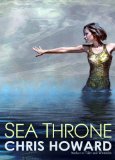Seaborn is a unique fantasy; it’s unlike anything else I’ve read. Chris Howard tells a compelling story of merpeople and of two women who struggle to become their own woman (or mermaid) in the face of opposition.
Our heroines are Corina Lairsey, a California girl who becomes possessed by a megalomaniacal merman while scuba-diving, and Lady Kassandra, an exiled princess of the Seaborn who is hatching a plan to overthrow her usurping grandfather. Howard does a great job with Corina’s plight, vividly showing us Corina’s terror at finding herself taken over by another being, her heartbreak and horror as her body is used to commit unspeakable acts of violence, and her struggle to free herself. Kassandra can be harder to get a grip on; her behavior and moods are a bit on the erratic side. There’s a reason for that, though — like Corina, Kassandra isn’t alone in her head. She carries the voices of her ancestors within her, and their reactions occasionally land Kassandra in trouble. Seaborn follows these two women as they try to seize control of their own lives.
Howard does a fine job of describing the beauty and danger of the sea, and the culture of the Seaborn. Their society is largely based upon ancient Greece, as is their magic. Chris Howard clearly knows a great deal about ancient Greek mythology and occultism. There’s a certain satisfaction, to a mythology buff like me, in reading a novel by someone who knows who Melinoe is, and in getting out my books after finishing Seaborn to see whether the character of Akaste is based on a real mythological figure. (Answer: She is.)
There are a few issues. There’s a bit of head-hopping. I’m not talking about the shifting Point Of View that Howard uses intentionally to show the battle for dominance inside Corina’s head; that’s done well. It’s the random head-hopping that’s the problem; for example, when the POV switches abruptly from Kassandra to a police officer.
Also, there’s a fine line between “lush, descriptive prose” and “purple prose,” and that line isn’t in the same place for every reader. Some of the prose in Seaborn went over my “thin purple line,” though this was mainly in the first scene (which is also where the most obvious head-hop occurs). There’s some good stuff in that scene too, though. I loved the image of all the pathways to the sea revealing themselves to Kassandra in an attempt to beckon her home. Elsewhere in Seaborn the prose is evocative and strange in a way that serves to highlight the alien nature of the Seaborn’s realm. I could almost smell the sea.
The final issue is that, occasionally, a word or two of modern usage slips into the dialogue of characters who wouldn’t be using it.
These small gripes aside, I thoroughly enjoyed Seaborn. As I mentioned before, it’s unique, and never feels like a warmed-over version of anything else. It’s for anyone who loves the sea, and anyone who likes stories about young women striving for independence and their own power.
Maps and family trees are available at Chris Howard’s website. I only wish they’d been in the book!


 Seaborn by Chris Howard
Seaborn by Chris Howard




It would give me very great pleasure to personally destroy every single copy of those first two J. J. Abrams…
Agree! And a perfect ending, too.
I may be embarrassing myself by repeating something I already posted here, but Thomas Pynchon has a new novel scheduled…
[…] Tales (Fantasy Literature): John Martin Leahy was born in Washington State in 1886 and, during his five-year career as…
so you're saying I should read it? :)